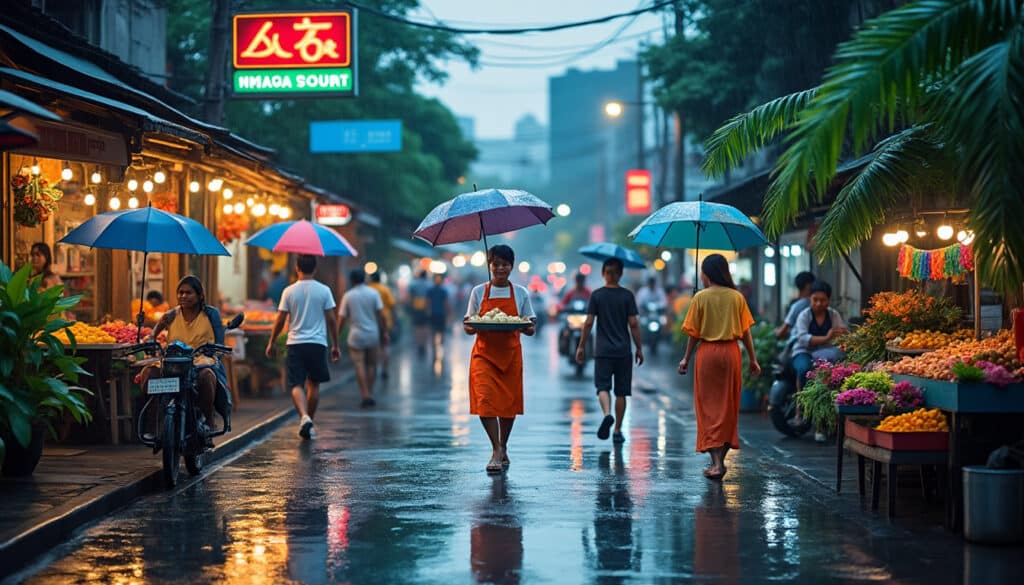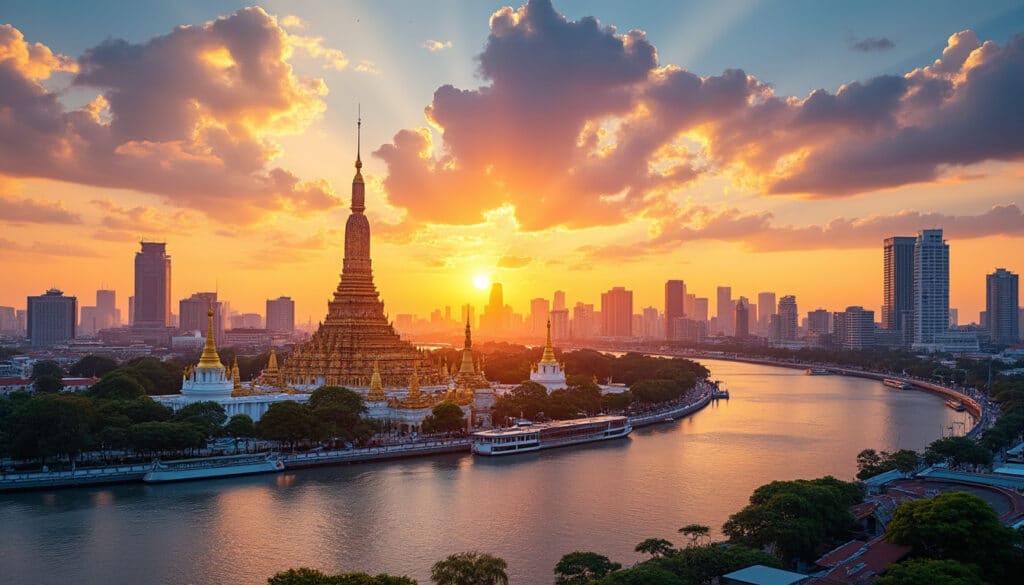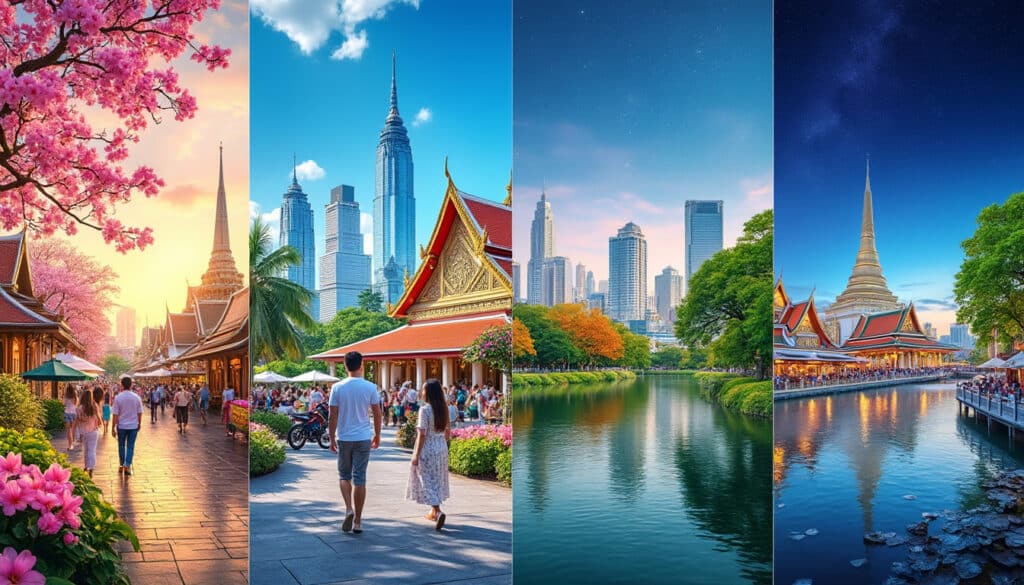Welcome to the vibrant metropolis of Bangkok, where the temperatures soar and the tropical vibes are unparalleled. This bustling city in Southeast Asia, renowned for its rich history and vibrant culture, offers travelers and residents a unique climate experience. With its year-round urban warmth, Bangkok is a city where the heat becomes an integral part of daily life. Whether you’re strolling through the lively streets or exploring the majestic temples, the temperatures in Bangkok create an ambiance that is both invigorating and challenging. Prepare to embark on a journey through Bangkok’s diverse climate landscape, exploring the various factors that contribute to its characteristic weather patterns.
Understanding Bangkok’s Climate: The Tropical Essence
Bangkok’s climate is a fascinating blend of tropical allure and urban resilience. As the capital of Thailand, it experiences a tropical savanna climate that lends itself to hot, humid conditions throughout the year. This Southeast Solstice city is characterized by three primary seasons: the hot season, the rainy season, and the cool season. Each season brings its own set of challenges and joys, ensuring that residents and visitors alike must adapt and appreciate the ever-changing weather.
During the hot season, which typically lasts from March to June, temperatures can soar above 35°C (95°F). This period is marked by an intense Bangkok Heat that can be overwhelming for those unacclimated to such conditions. The average high temperature during April, known as the hottest month, is around 36°C (97°F), with humidity levels often exceeding 70%. The Thai Sun is at its most potent during these months, necessitating the use of sun protection and hydration strategies to ensure comfort and safety.
As the Bangkok Breezes usher in the rainy season from July to October, the climate becomes a curious mix of intense downpours and rejuvenating freshness. The city transforms as rain showers sweep in, offering a respite from the heat and adding a new dimension to the urban landscape. On average, the city receives 1200mm (47 inches) of rain annually, with September usually being the wettest month. It’s crucial to navigate this season with a keen awareness of the potential for flooding, often resulting from the persistent rains. For more information about the rainfall patterns and potential flooding risks in Bangkok, click here.
Finally, the cool season arrives from November to February, providing a welcome relief from the heat and humidity. Although “cool” is relative, as average temperatures during the day remain around 30°C (86°F), nights can bring a refreshing drop to the mid-20s°C (68°F). This season, often considered the most pleasant time to visit, sees a surge in tourists eager to experience the iconic tropical essence of Bangkok without the intense heat. Additionally, the lower humidity levels make outdoor activities more enjoyable.
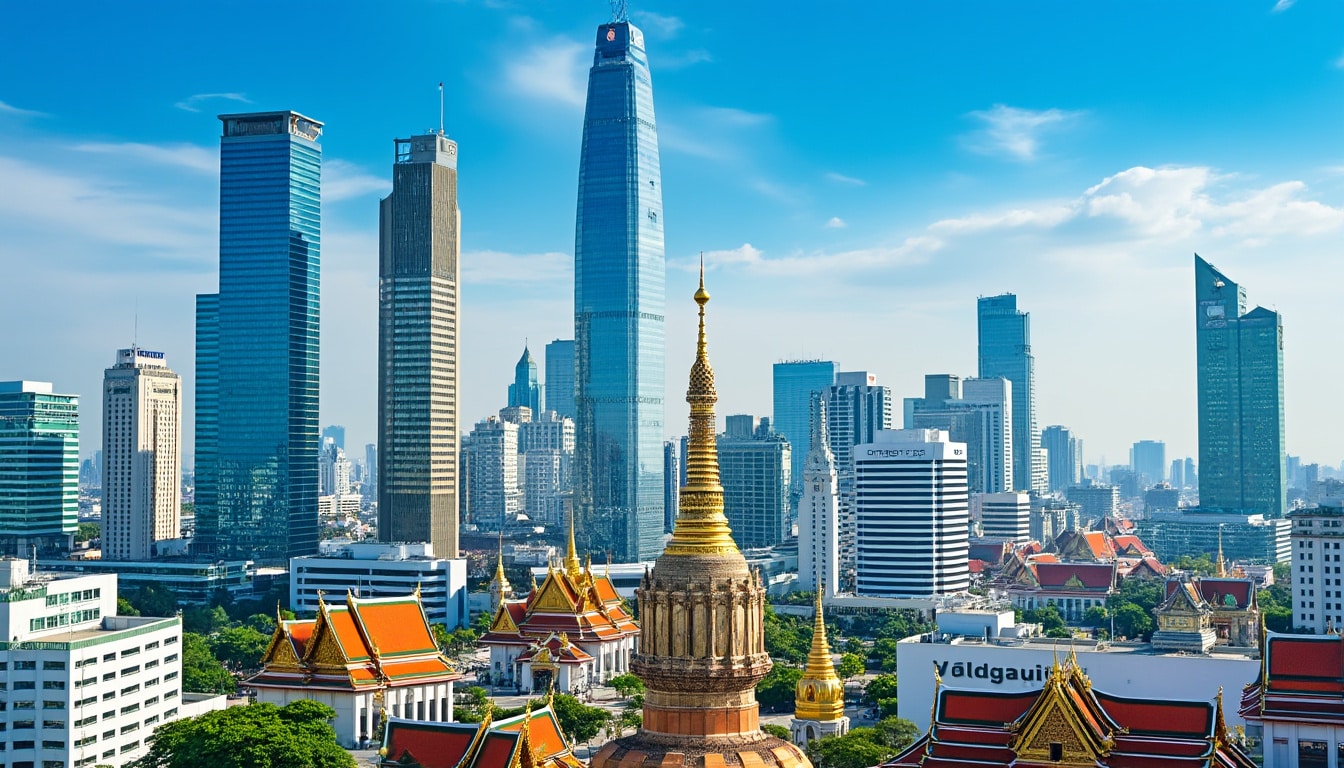
For those planning to explore Bangkok during the varying seasons, it’s essential to dress appropriately and take necessary precautions. Here are a few tips:
- ☀️ Hot Season: Wear lightweight, breathable fabrics such as cotton or linen to combat the heat.
- ☔ Rainy Season: Carry an umbrella or raincoat to tackle unexpected rain showers.
- 🌤️ Cool Season: Layer clothes for the cooler evenings while enjoying the mild days.
Seasonal changes in Bangkok provide a dynamic backdrop for both exploration and relaxation. Understanding these patterns is crucial for anyone looking to immerse themselves in the full spectrum of Bangkok’s climate. To learn more about the specific seasonal weather in Bangkok, visit this page.
The Impact of Temperature on Daily Life in Bangkok
The temperature in Bangkok is more than just a number; it impacts daily life in myriad ways. The bustling city, with its lively streets filled with street food vendors, tuk-tuks, and tourists, adapts to the ever-present heat in fascinating ways. The local lifestyle, economy, and even cultural practices are intertwined with the city’s climatic rhythms.
First and foremost, the Bangkok Heat influences the thriving street food culture. Vendors strategically set up their stalls, taking advantage of shaded areas or venturing out during the early morning and late afternoon when temperatures are more manageable. The use of large umbrellas and makeshift canopies is a common sight, providing protection to both food enthusiasts and vendors alike. Moreover, delicious local dishes, such as spicy papaya salad and juicy grilled meats, become even more enticing as residents look for flavorful ways to stay cool during sweltering days.
Another area significantly impacted by the tropical climate is the energy consumption. Air conditioning units play a crucial role in maintaining comfortable indoor environments, especially during the hottest months. Many offices, shopping malls, and public spaces utilize advanced Bangkok WeatherTech solutions to optimize energy efficiency while providing a refreshing oasis from the urban warmth. However, this increased reliance on air conditioning also poses challenges, such as heightened electricity demand and environmental concerns.
The cultural aspect of Bangkok is also influenced by the temperatures, as festivals and events often adjust their timing and format to accommodate the climate. For instance, the Songkran Festival, celebrated in April, is a water-based event that aligns perfectly with the rising temperatures. Participants engage in water fights and other aquatic activities to both celebrate and cool down, integrating cultural traditions with practical responses to the heat.
For those planning their daily activities, understanding the typical day in Bangkok can be beneficial. Here is an average day itinerary adjusted for the temperatures:
- 🌅 Morning: Explore temples or markets during the cooler hours, typically from 7 AM to 10 AM.
- ☀️ Midday: Seek indoor activities or enjoy a leisurely lunch in air-conditioned venues from 11 AM to 3 PM.
- 🌇 Evening: Relax in parks or enjoy open-air markets from 4 PM to 8 PM.
Adapting to Bangkok’s temperature doesn’t just involve adjusting daily schedules but also selecting appropriate accessories and clothing. Many residents opt for HeatWave Gear, such as sun hats and UV-blocking sunglasses, to navigate the streets comfortably.
In summary, the impact of temperature on Bangkok’s daily life is significant and nuanced, affecting various aspects from food culture to energy consumption and cultural events. Residents have honed their skills in embracing the Tokyo heat, finding innovative solutions to thrive amidst the changing climates.
Analyzing the Monthly Temperature Variations in Bangkok
Bangkok’s climate is as dynamic as its culture, with monthly temperature variations that provide a unique narrative of the city’s weather patterns. Understanding these variations is crucial for both planning visits and day-to-day life in this thriving metropolis.
Monthly temperatures in Bangkok exhibit slight but notable fluctuations, influenced by seasonal changes. Here’s an overview of the average monthly temperatures:
| Month | Average High (°C) | Average Low (°C) | Precipitation (mm) | Features 🌧️ |
|---|---|---|---|---|
| January | 31 | 23 | 10 | Minimal rain |
| April | 35 | 26 | 65 | Intense heat 🌞 |
| July | 33 | 26 | 150 | Start of rainy season |
| October | 32 | 25 | 238 | Peak of rainy season |
January marks the height of the cool season, with relatively mild temperatures and minimal rainfall. This month sets the stage for comfortable explorations of Bangkok’s cultural landmarks. Conversely, April signals the assertive Thai Sun as temperatures begin to peak. This warm atmosphere demands strategic planning when visiting outdoor attractions.
The months of July and October present a stark contrast as Bangkok transitions into the rainy season. July offers a gentle introduction to the monsoons, while October culminates in significant rainfall, challenging even the most prepared urban explorers. For more detailed insights into the rainy season complexities, including its influence on daily life and infrastructure, check here.
With such diverse climate patterns encapsulated in monthly variations, understanding Bangkok’s temperature shifts enhances both travel plans and local experiences. Whether taking advantage of the cooler January weather or bracing for October’s wet challenges, awareness of these patterns equips individuals with the knowledge needed to thrive in this tropical metropolis.
Long-Term Climate Patterns and Predictions for Bangkok
As 2025 unfolds, long-term climate trends in Bangkok become increasingly relevant. The global discourse on climate change and its impacts is mirrored in this urban powerhouse, where adaptation measures and resilience strategies emerge as critical components of the city’s sustainability efforts.
Current projections for Bangkok indicate that temperatures will continue to rise, with more frequent heatwaves becoming a possibility. This trend necessitates innovative solutions to counter the adverse effects of prolonged heat exposure. Urban green spaces, such as parks and rooftop gardens, have emerged as key elements in mitigating urban heat islands and enhancing air quality.
Moreover, the unpredictability of rainfall patterns adds complexity to the climate narrative. Recent years have witnessed shifts in monsoon timings and intensity, impacting water management systems and infrastructure readiness. The adaptation strategies include the enhancement of Bangkok WeatherTech, which involves advanced weather monitoring and prediction technologies to provide timely alerts and safeguard communities against extreme weather events.
Flood management remains a significant concern for Bangkok, considering the city’s geographical positioning and low-lying terrain. The strategies to address this include the construction of flood barriers and the implementation of drainage improvement projects. For further information on Bangkok’s flooding risks and mitigation efforts, explore this link.
To ensure that the city remains habitable and thrives amidst these changes, institutions and local communities collaborate on sustainability initiatives. Emphasis on urban heat reduction measures, such as promoting energy-efficient buildings and advocating for sustainable transport options, plays a pivotal role in Bangkok’s climate action agenda. To get a comprehensive overview of Bangkok’s adaptation strategies and future climate goals, refer to this resource.
Overall, the evolving climate patterns present both challenges and opportunities for Bangkok. As the city navigates through these changes, proactive strategies and community involvement remain essential. In this way, Bangkok charts a path towards resilience, seeking to safeguard its rich cultural heritage and vibrant lifestyle amidst the uncertainties of climate change.
The Influence of Technology on Bangkok’s Weather Monitoring
In the face of changing climatic conditions, Bangkok leverages technology to enhance weather monitoring and prediction capabilities. As a city that thrives on innovation, the integration of technology into weather management systems offers both efficiency and accuracy, crucial for informed decision-making and safeguarding communities.
The emergence of app-based weather platforms, such as Bangkok WeatherTech, provides real-time updates on temperature, precipitation, and air quality. These applications empower residents and tourists to plan their activities, ensuring maximum comfort and safety amidst unpredictable weather. WeatherTech solutions utilize advanced sensors coupled with AI technology to gather and analyze data, offering precise forecasts and timely alerts.
Moreover, technology intersects with climate education. Initiatives aimed at raising awareness about climate change and its local impacts employ interactive platforms, encouraging public participation. Educational programs utilize virtual seminars, webinars, and workshops to engage residents, equipping them with knowledge on climate adaptation strategies and sustainable practices.
Furthermore, governments and meteorological institutions collaborate on large-scale climate projects, enhancing data collection and sharing. This collaboration fosters cross-border partnerships, enabling Bangkok to learn from best practices in other tropical cities facing similar challenges. For more about Bangkok’s tech-driven climate interventions, visit here.
In conclusion, the integration of advanced technology and collaborative efforts significantly enhances Bangkok’s capabilities in monitoring and managing weather conditions. As the city continues to adapt to its evolving climate, innovations in weather technology remain a cornerstone of its sustainability vision. With these tools, Bangkok prepares for a future where climate resilience is achievable through collective knowledge and action.
FAQ About Bangkok’s Temperatures
To enhance your understanding of Bangkok’s climate and provide practical guidance, here are some frequently asked questions:
- What is the hottest month in Bangkok? 🌞 The hottest month in Bangkok is April, with average high temperatures reaching 36°C (97°F).
- Is it advisable to travel to Bangkok during the rainy season? 🌧️ Yes, the rainy season offers a unique experience with lush landscapes; however, plan for indoor activities and carry rain protection.
- How does Bangkok manage its flooding risks? 🌊 Bangkok implements flood barriers, drainage systems, and community planning to mitigate flooding risks and enhance resilience.
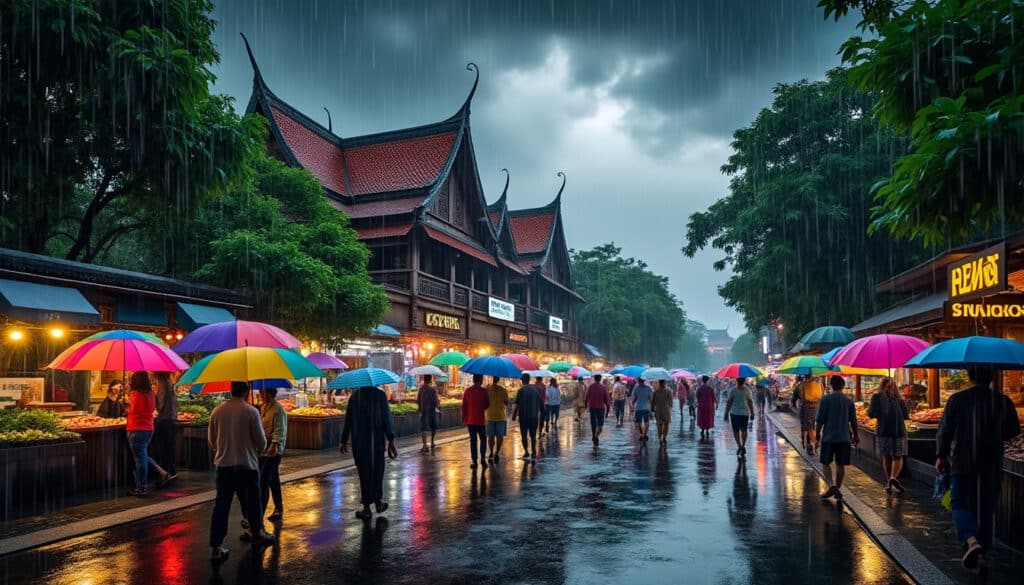
Bangkok, the vibrant capital of Thailand, is well-known for its bustling street life, cultural landmarks, and a captivating tropical monsoon climate. With travelers pouring in from all around the world to experience its warmth and hospitality, understanding the patterns of…
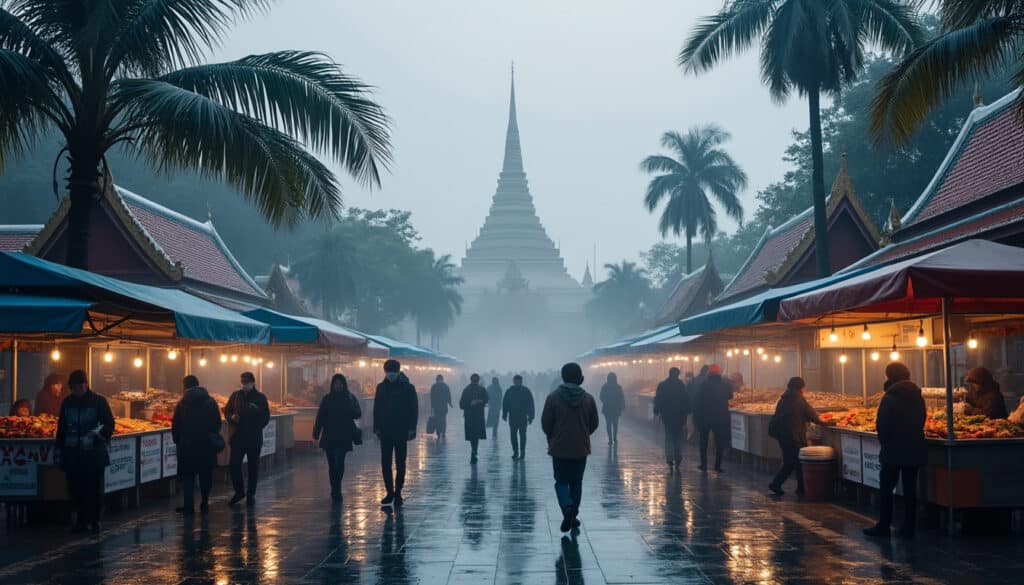
Bangkok, a city well-known for its tropical climate and bustling activity, experiences an unusual wonder when temperatures drop unexpectedly. The capital, more used to the hot sun, sees rare spells of cold weather that surprise both locals and travelers. This…
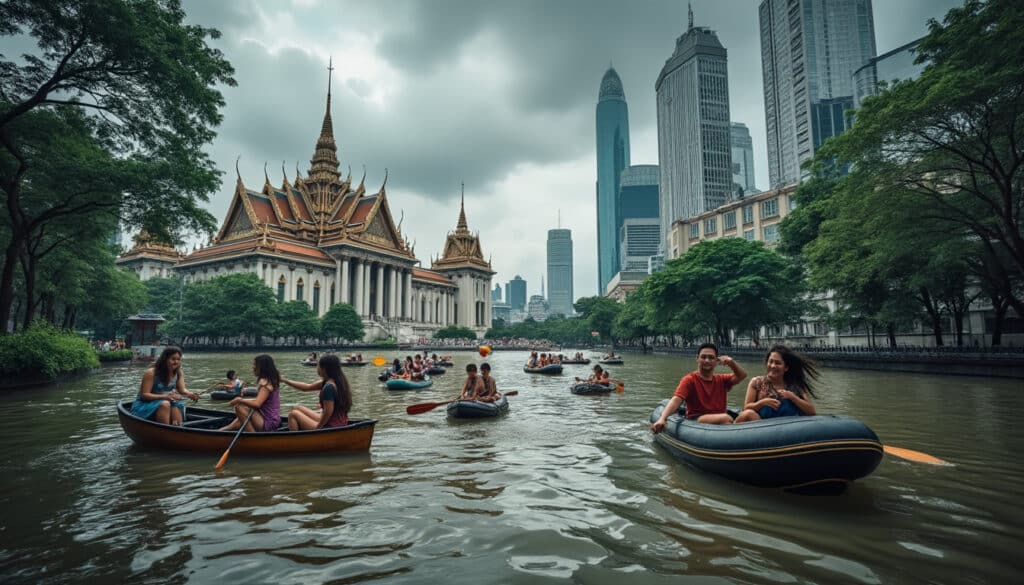
Flooding and natural risks in Bangkok
Bangkok is a city that beautifully combines traditional Thai culture with modern urban life. However, it is also a city that faces significant challenges due to the risks posed by natural disasters, particularly flooding. As climate change continues to impact…

Bangkok, a city teeming with vibrant energy and colorful street life, can boast many attractions. However, as visitors quickly discover, the city’s tropical weather plays a significant role in shaping their experiences. With temperatures routinely soaring and humidity levels remaining…
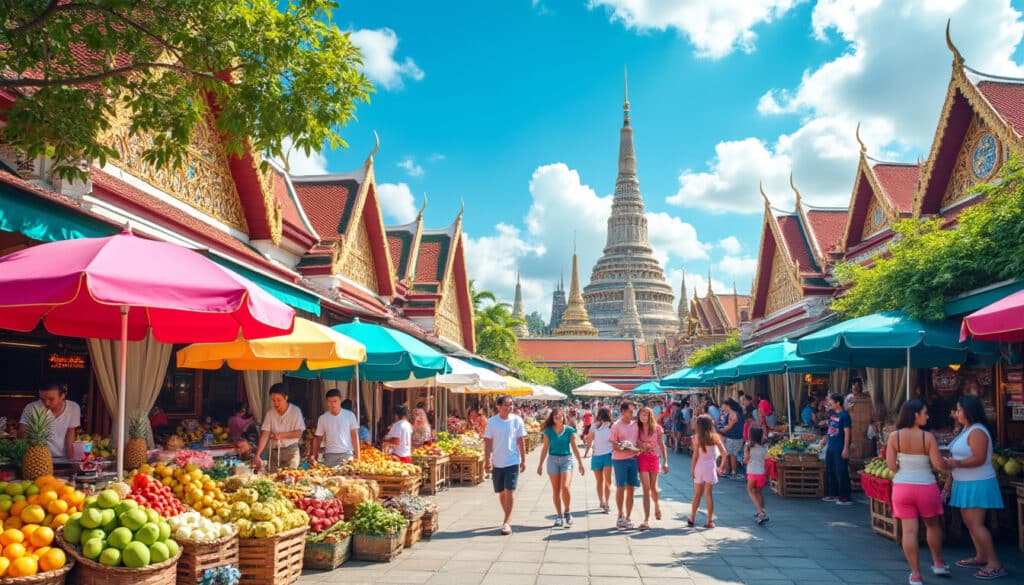
Is Bangkok warm throughout the year?
As a bustling metropolis known for its vibrant street life and cultural landmarks, Bangkok also boasts a distinct tropical monsoon climate. This climate makes it a year-round destination for travelers from around the globe. The city’s unique weather conditions are…

Rain and precipitation in Bangkok
Bangkok, a vibrant city renowned for its bustling markets, street food, and ornate temples, is also known for its distinctive weather patterns. Nestled along the banks of the Chao Phraya River, this metropolis experiences a tropical climate, marked by a…
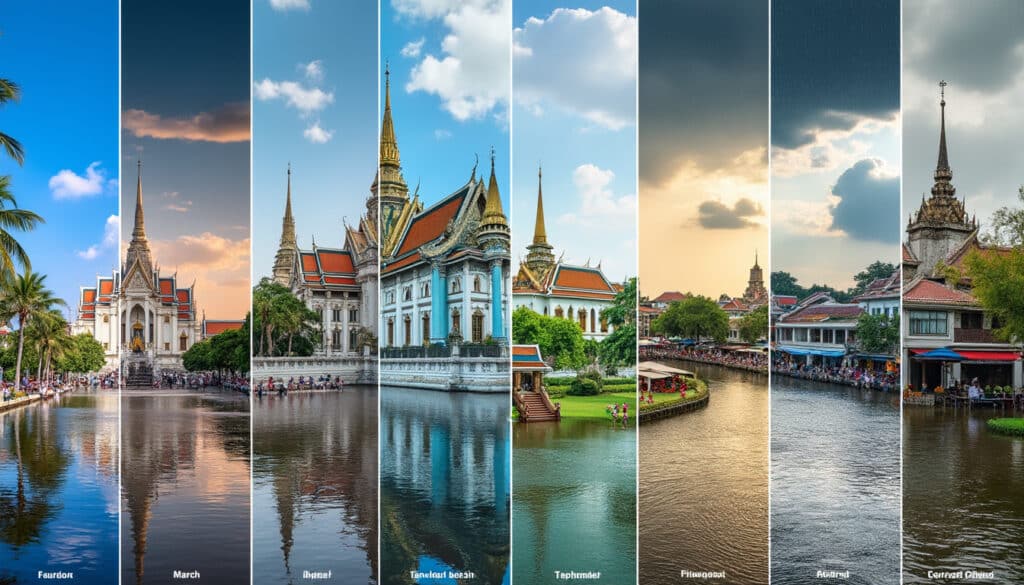
Bangkok is a city of vibrant street life and soaring temples, nestled within a tropical climate that both enchants and challenges visitors. Understanding its weather is key to making the most of any trip. This bustling metropolis experiences marked shifts…
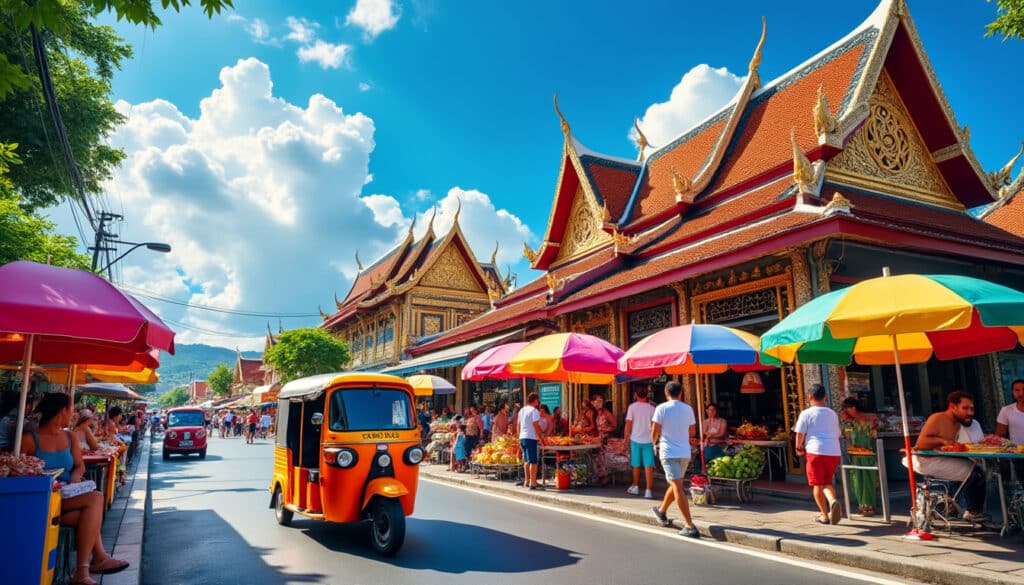
What is the weather like in Bangkok?
Nestled in the heart of Thailand, Bangkok is a bustling metropolis renowned for its rich cultural tapestry, vibrant street life, and bustling markets. But before planning a trip to this dynamic city, understanding Bangkok’s weather patterns is crucial. From intense…



